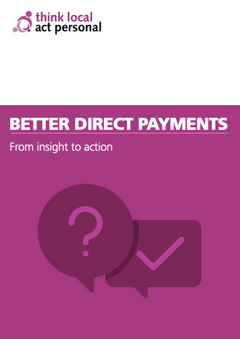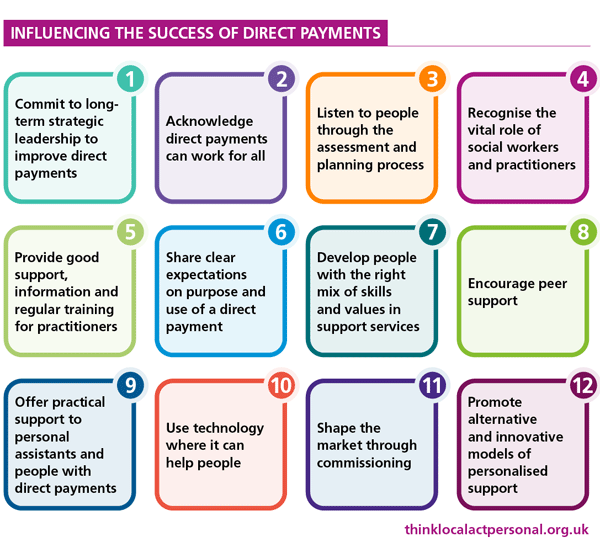Better Direct Payments: from insight to action

The principle behind direct payments is that people can have choice and control over the care and support they are entitled to. In some places, people's lived experience of taking and managing a direct payment is falling short of the intentions enshrined by policy in the Care Act. This report Better Direct Payments; from insight to action (opens new window) addresses how to make them work better.
There is much that can and should be done to improve people’s experience of direct payments. It needs concerted and continuing effort with ongoing engagement with people drawing on care and support through co-production.
This report is based on work with Essex County Council, a review of the available research, and discussions with four councils and two user led organisations. Identifying some of the key barriers and enablers that contribute to the effective delivery of direct payments, we aim to help councils and other people to extend their efforts and determination to make them work better for more people. Download two page summary report (opens new window)
Key takeaways
- Long-term strategic leadership commitment is needed, and direct payments should fit with other strategic priorities. This strategic commitment should be agreed in co-production with people with lived experience and their organisations.
- Direct payments can work for all groups who access long term community-based care and support. Although there are risks of abuse with direct payments, if properly managed, there is no clear evidence they are riskier than other forms of care and support. Concerns that people will not spend the money on meeting their needs are not borne out in evidence.
- People’s voices should be heard throughout the assessment and care and support planning process. Where people are supported to use their direct payment flexibly and creatively, they can focus on using the money to live good lives - not just being clean, dressed and fed.
- The role of social workers and other assessment practitioners is pivotal in supporting people to take and manage a direct payment. Clear information and advice, supplemented with support from people who have lived experience in how direct payments work is essential, so that everyone is clear on the purpose of direct payments and how the local system operates.
- Practitioners should receive regular training, development and support. They need to feel confident in upholding the values and approach to self-directed support, whilst remaining sensitive to people’s individual circumstances and choices.
- When setting up a direct payment everyone involved should have a clear and shared expectation on the purpose of the direct payment and how it can be used, both within the council and with the person.
- Having people with the right qualities and motivations and a mix of skills and experiences within a direct payment support service is crucial.
- Peer support between direct payment recipients works really well to provide good support and information to all stakeholders. Disabled people often want to provide peer support to each other around direct payments, but whilst councils can and should do everything they can to support this, they can’t make it happen as if it were a commissioned service.
- Good support to direct payment recipients and personal assistants can mitigate and help address conflict that can arise from the close personal nature of the relationship.
- Technology can help with taking and managing direct payments, but should not been seen as a panacea. There are limited examples of technology being used to connect people with direct payments to each other, or helping them to access information on the options available to assist their support.
- How individual local authorities approach their commissioning work affects the way direct payments can be fully realised, maximising choice and control.
- Innovative models of support like micro-provision and co-operatives can offer more tailored and personalised care and support than established types of provision. They need the support of commissioners for their full potential to be realised.
